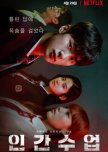
This review may contain spoilers
★ Mask Girl – A Brutal, Beautiful Tragedy Beneath the Makeup
There are shows that entertain, and then there are shows that haunt.Mask Girl is very much the latter — a gritty, painful, and deeply layered K-drama that drags you down into the ugly underbelly of beauty standards, shame, and vengeance. It's not a comfortable watch, but it's unforgettable.
At its core, Mask Girl is a story about identity — how it’s shaped, broken, and stolen. It follows Kim Mo-mi, a woman relentlessly judged for her appearance from a young age, and the devastating ripple effect this rejection has on her life. And from the moment you hear her voice in that childhood recording, declaring “I want to be loved by everyone,” you realize — this isn’t a story about vanity. It’s a story about survival in a world that denies you love unless you’re perfect.
"A Monster Isn't Born — It's Created"
That one quote could summarize the entire essence of Mask Girl.
Mo-mi doesn’t begin as someone malicious or dangerous. She’s just a girl. A girl with dreams, with pain, with an aching need to be accepted. But she grows up constantly told she's not good enough, not beautiful enough, and slowly, over the years, she learns to wear masks — literal and metaphorical — to be seen.
Every phase of her life plays out like a new tragedy. Different actresses portray her through these stages, and yet somehow, it never feels disjointed. That deep, heavy sadness remains consistent — especially in the eyes. It’s a masterclass in casting and acting. Each version of Mo-mi carries the trauma of the last, slowly unraveling until there's nothing left but pain and desperation.
The show subtly and powerfully highlights how society creates the very monsters it later condemns. From parental pressure, misogyny, and superficial beauty standards to online harassment and revenge culture, every theme hits hard — because none of it feels exaggerated. It’s grounded. Real. And that’s what makes it all the more painful.
Social Commentary in Every Frame. The show excels as both a beauty drama and a societal critique. It dissects the obsession with appearance and the way society punishes women who fall outside the mold — or worse, women who fight back.
Mo-mi’s journey is contrasted sharply with those around her — other women clinging to power, men using and discarding her, and even her eventual transformation into something unrecognizable. But the tragedy is that she was never truly ugly. The world told her she was, and that lie changed everything.
The Acting is Phenomenal. This point can’t be stressed enough. Every actress who plays Mo-mi gives a gut-wrenching performance, especially in the scenes where everything starts to fall apart. Whether it’s her quiet desperation, explosive rage, or crushing isolation, the performances are raw, human, and impossible to look away from.
You feel for her. Even when she’s done terrible things.
Because you understand why.
And that kind of empathy is powerful — and rare.
The final episode is where everything truly sinks in.
Her daughter — the only one left to carry on Mo-mi’s story — finds an old tape where young Mo-mi is asked:
“What do you want to be when you grow up?”
“I want to be loved by everyone.”
And that’s the moment you realize — it was never about fame or revenge. She just wanted love.
But instead, her life was consumed by rejection and judgment.
Just as the daughter begins to understand the truth, she’s shot dead by another broken woman — one obsessed with her son’s death, blind to the fact that her son was never innocent. It’s a cycle of grief, denial, and generational trauma that ends not in redemption, but in silence.
That final moment doesn’t offer comfort — and that’s the point.
It offers reflection.
A chance to sit in your discomfort and think: What happens when the world doesn’t let you be loved?
Mask Girl is cruel. Heart breaking. Messy.
But it’s also beautifully told, emotionally rich, and unafraid to hold a mirror up to society and force us to look. It doesn't paint heroes or villains — it paints people. Broken, flawed, desperate people.
A devastatingly honest, beautifully acted, and emotionally layered critique of beauty, identity, and how easily the world turns love into punishment.
Was this review helpful to you?

Review of Extracurricular: A Masterpiece of Moral Ambiguity and Tragic Romance
Extracurricular is one of those rare K-dramas that sticks with you long after the credits roll. Its power lies not only in its gripping story and well-crafted suspense but in the way it challenges viewers’ sense of morality, justice, and empathy. The show masterfully turns traditional narratives on their heads, making us root for characters whose actions are undeniably wrong, even horrifying. It is a dark, unflinching exploration of human nature, trauma, and the desperate lengths people go to for survival and connection.At the heart of the story is Jisoo, a seemingly unremarkable and introverted high school student whose double life is as an operator of an illegal escort business. Watching his journey is both fascinating and deeply unsettling. Early in the series, a moment where Jisoo breaks down and cries simply because someone treats him like a human being immediately evokes sympathy. This moment is critical—it reveals the deep loneliness and dehumanization he has endured. Yet, as the story progresses, we witness a transformation—or perhaps a revealing—of Jisoo’s darker nature. He moves from being a scared, vulnerable boy to orchestrating violent and ruthless decisions. Still, the show keeps him human, making it impossible not to root for him despite the awful things he does. This emotional conflict is where Extracurricular shines: it blurs the line between hero and villain so well that you are forced to confront your own sense of right and wrong.
Gyuri plays a pivotal role in this narrative, not just as a catalyst for Jisoo’s descent but as a complex character in her own right. While some viewers might blame her for “ruining” Jisoo’s life, the truth is far more nuanced. Gyuri’s motivations stem from a desperate desire to escape her troubled home life and regain some control in a chaotic world. Her rebellion and choices reflect deep pain and vulnerability, not malice. She and Jisoo share a messy, intense bond that defies simple categorization. Their relationship is as much about mutual recognition of each other’s brokenness as it is about love. It’s a raw, imperfect romance that fuels much of the show’s emotional tension. Their connection adds layers of tragedy and humanity, reminding us that even in the darkest circumstances, the need for connection remains powerful.
What makes Extracurricular truly exceptional is how it flips perspective. If we watched the story from the victims’ point of view—those exploited, threatened, and harmed—we would undoubtedly wish for justice and hope to see Jisoo and Gyuri face consequences. Yet the show traps us inside the protagonists’ minds, making us sympathize and even root for them. This narrative inversion creates a disturbing but brilliant tension that stays with you. It forces viewers to reckon with uncomfortable truths about empathy and the complexity of human behavior.
The show’s storytelling is complemented by its visual language. The progression from lighter, muted tones to darker, more oppressive scenes mirrors the moral decay and rising tension perfectly. Every frame contributes to the building sense of doom that feels inevitable but heartbreaking.
Finally, the ending of Extracurricular is a masterpiece of ambiguous storytelling. It resists the temptation to offer closure or neat resolutions, instead leaving viewers with haunting uncertainty. The open ending is not lazy writing but a deliberate artistic choice that invites reflection. It asks us to sit with the uncomfortable emotions of the story—the sadness, the loss, and the moral confusion—and to ponder what justice even means in such a broken world.
Although many fans would love a second season, the show’s impact lies in its singular, self-contained story. Extending it might dilute the painful beauty of its unresolved finale. Instead, Extracurricular stands as a tragic, unforgettable exploration of the human condition, where villains have reasons, love is flawed and complicated, and morality is never black and white.
In conclusion, Extracurricular is a haunting drama that challenges viewers to empathize with the unlikeliest of characters, confronts the messy realities behind “villainy,” and delivers a tragic romance that is as heartbreaking as it is authentic. It is a show that will stay with you—challenging your thoughts and emotions long after you finish watching.
Was this review helpful to you?

Trigger: A beautiful moral and social issue drama.
Trigger opens in a near-future South Korea that has successfully banned firearms for decades, creating a society that believes itself to be peaceful and secure. But that illusion shatters when illegal guns suddenly begin flooding the country, igniting fear, chaos, and violence. At the heart of this national crisis is Lee Do-hyeon, a former military sniper turned detective, who is pulled into a rapidly escalating war against a mysterious and highly organized gun trafficking operation. As he hunts down the elusive arms broker Kang Joo-hyun, the show evolves into a gripping examination of justice, morality, and how quickly society can unravel once its sense of safety is stripped away.What makes Trigger stand out is not just its action-packed sequences or crime-thriller intensity, but its unflinching dive into urgent societal and moral questions. This is a show that dares to ask: what would happen if a gun-free nation was suddenly armed overnight? It imagines the terrifying real-world consequences, portraying how quickly fear spreads and how deeply it corrodes trust in institutions, communities, and even family.
The drama doesn't romanticize violence—it shows its horrifying unpredictability. Everyday people are suddenly placed in life-or-death situations, and Trigger thoughtfully explores how they respond. Some cling to their values, others spiral into fear-driven aggression, and many begin to question what "justice" really means when survival is on the line. The tension is not just physical but deeply psychological and ethical.
This is a series that clearly holds a mirror up to our own world, drawing parallels to real debates around gun control, government failure, and public panic. It doesn’t feel like fiction—it feels like a chillingly possible scenario.
The performances in Trigger are nothing short of phenomenal. Kim Nam-gil brings incredible emotional weight to the role of Lee Do-hyeon. His portrayal of a man haunted by war and burdened with responsibility is raw and deeply affecting. He balances physical presence with a deeply internalized struggle, making every decision feel layered with past trauma and moral conflict.
Opposite him, Kim Young-kwang shines as Kang Joo-hyun, a character who could have easily been reduced to a one-dimensional villain. Instead, he brings complexity and charisma to the role, offering a chilling look into the mind of someone who thrives in chaos. Their scenes together are electric—tense, philosophical, and emotionally charged.
Even the supporting cast delivers, with believable, grounded performances that further humanize the story. Whether it's grieving civilians, stressed-out law enforcement, or morally conflicted government officials, every character feels like a real person trying to survive a nightmare.
From the very first scene, Trigger announces its production quality with authority. The cinematography is sleek, modern, and atmospheric, often leaning into a cool, urban palette that emphasizes tension and unease. Each episode is shot with cinematic care, with compositions that feel more like a feature film than a traditional drama.
Action scenes are crisp, brutal, and terrifyingly realistic. Unlike shows that glorify gunplay, Trigger frames violence as chaotic and life-altering. The gunshots are loud, the consequences are immediate, and the fear is palpable. Sound design, editing, and pacing all work together to maintain intensity without becoming overwhelming.
The show also benefits from a hauntingly effective score that heightens the tension without ever overpowering the drama. It looks and sounds like prestige television—and it never lets you forget the stakes.
Trigger is far more than just a gripping crime series. It’s a thought-provoking social drama that feels timely, urgent, and uncomfortably real. It explores how quickly people can change when fear sets in—how thin the line is between order and chaos. The acting is exceptional, the writing is bold, and the production quality elevates every moment to cinematic levels.
And yes — I watched the entire thing in one day. That’s how addictive and consistently compelling it is.
This is not just a great Korean thriller—it’s a necessary one. Trigger forces us to confront difficult questions about power, fear, and responsibility, and it does so with a level of emotional and narrative sophistication that’s rare in action-driven dramas.
Was this review helpful to you?

 1
1
